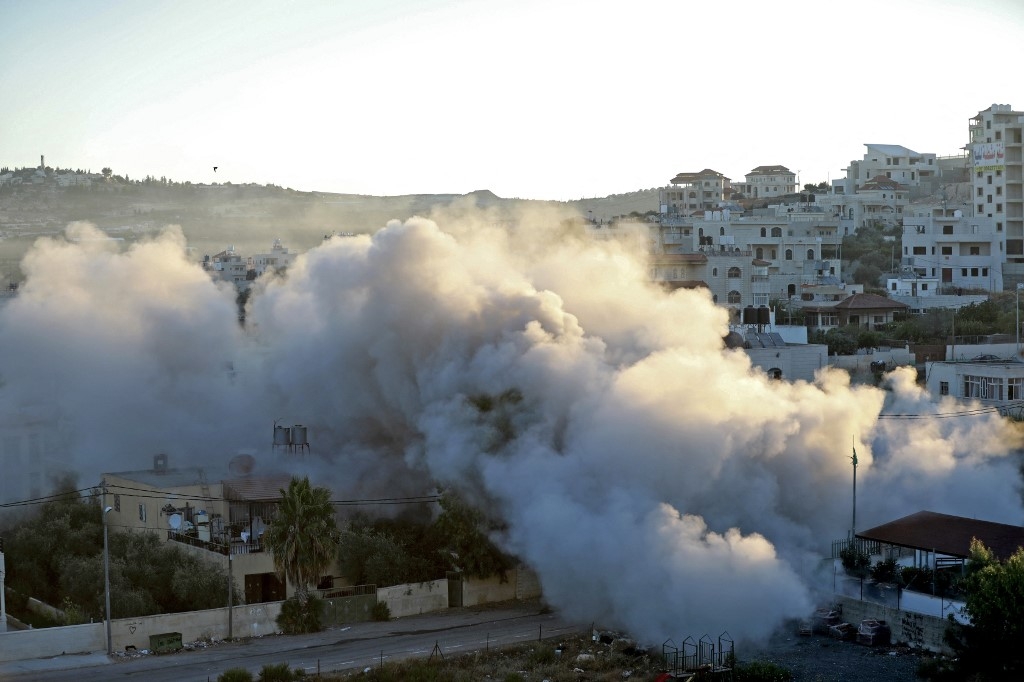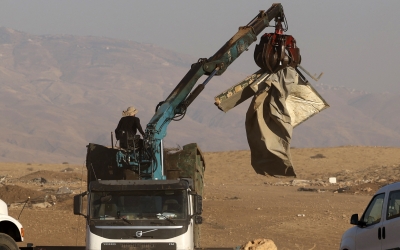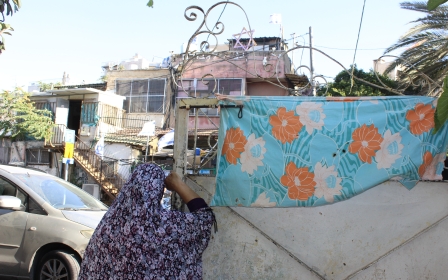US embassy issues rare rebuke to Israel over home demolitions

The US embassy in Jerusalem has formally denounced Israel's demolition of the family home of a Palestinian-American who was arrested in May after he fatally shot an Israeli civilian at a Nablus-area checkpoint.
On Thursday, Israeli forces detonated explosives, destroying Muntasir Shalabi's family home, after Israel's High Court last month rejected a petition filed by his family which argued that Shalabi's main residence was in the US, as he only spent a month or two in the Ramallah-area home each year.
Shalabi's estranged wife and three children were left homeless after the demolition.
"As we stated numerous times, the home of an entire family should not be demolished for the actions of one individual," the US embassy said in a rare rebuke following the demolition.
While the statement called on the Palestinians and Israelis to "refrain from unilateral steps that exacerbate tensions and undercut efforts to advance a negotiated two-state solution", it said "the punitive demolition of Palestinian homes" was one such step that exacerbated tensions.
Palestine's official Wafa news agency called the US criticism "unprecedented".
The office of Israeli Prime Minister Naftali Bennett responded to the US criticism on Thursday, saying: "The prime minister appreciates and respects the American administration. At the same time, he acts solely in accordance with the State of Israel's security considerations and protecting the lives of Israeli citizens."
'Inherently immoral and unlawful'
Israel has enacted a policy of punitive home demolitions against the families of those accused of acts of terror, even when the accused has been killed, since its occupation officially began in 1967.
Justice David Mintz, one of the three judges that oversaw the Shalabi family petition, wrote "the need for deterrence remains even when concerning a residence that includes minors".
The justices rejected the family's claim that Shalabi suffered from mental health issues and ruled that he carried out the attack out of a nationalist motive.
At least 28 people, including 11 children, have been left homeless by punitive home demolitions since the start of last year, according to Israeli rights group B'Tselem. Amid Israel's most frequent use of the practice during the Second Intifada, Israeli forces punitively destroyed more than 650 Palestinian homes, displacing more than 4,000 people.
'Even if this deterrent effect were achieved, it would not render the policy moral or legal'
- B'Tselem
In some cases, a specific apartment within a larger building that houses multiple families has been destroyed, compromising the structural integrity of the entire building.
Collective punishment is illegal under international law.
"This is not a complicated, theoretical legal principle but a matter of basic morality: Punishing innocents for the sins of others is unconscionable," a B'Tselem report on the practice reads.
Israeli authorities have attempted to justify punitive home demolitions with claims the practice deters other Palestinians from planning or carrying out attacks out of concern for their families' homes.
But B'Tselem notes: "The state has never presented any figures to prove that the demolitions do, in fact, deter Palestinians from carrying out attacks, nor has it ever been pressed to do so."
In 2005, an Israeli military committee determined that the efficacy of home demolitions as a deterrent was questionable, and that by "engendering hate" it caused more damage than good.
"Even if this deterrent effect were achieved, it would not render the policy moral or legal," B'Tselem said. "By harming innocents to achieve a goal that has nothing to do with them, the authorities treat these persons as a means rather than as independent human beings with rights. Such a policy is inherently immoral and unlawful."
Middle East Eye propose une couverture et une analyse indépendantes et incomparables du Moyen-Orient, de l’Afrique du Nord et d’autres régions du monde. Pour en savoir plus sur la reprise de ce contenu et les frais qui s’appliquent, veuillez remplir ce formulaire [en anglais]. Pour en savoir plus sur MEE, cliquez ici [en anglais].





